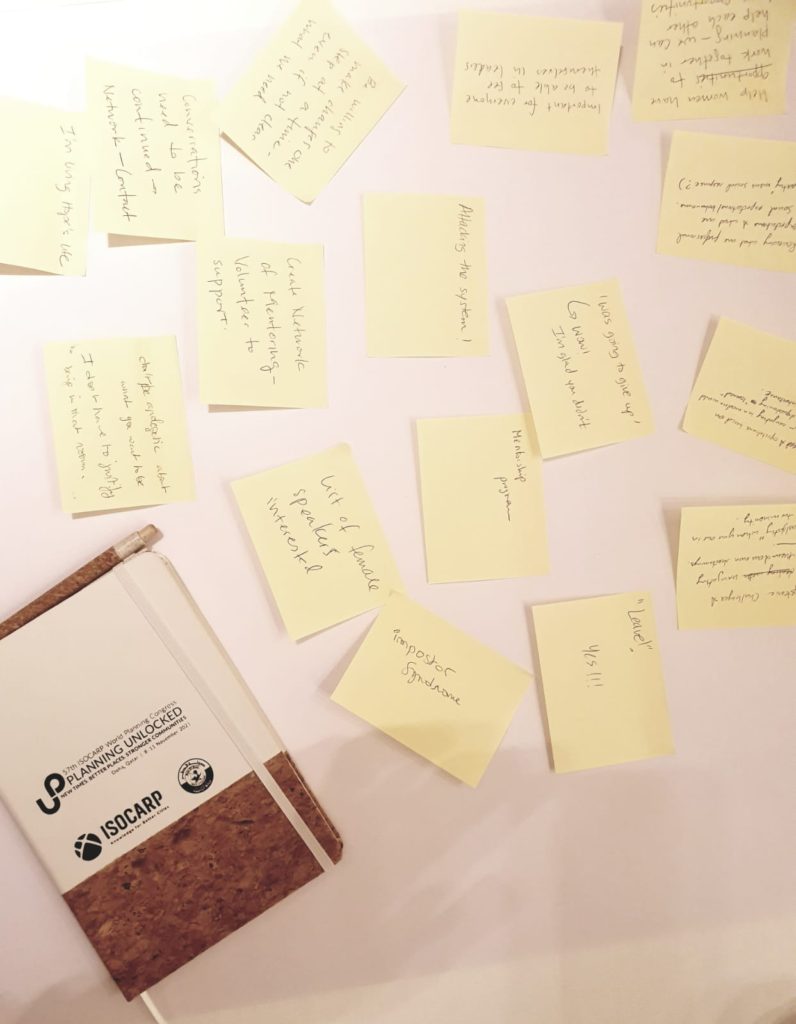What is your favorite sound?
Mine is the sound of stereotypes crashing down.
I was asked to give a short reflection at this year’s ISOCARP World Planning Congress as part of a ‘Women in Planning’ event. I was the last to speak. As I listened to the other speakers before me, I couldn\’t stop writing down quotes from their personal stories of success and struggle as female urban planners and professionals more generally.

I heard the leader of a well-known international planning studio saying she “was going to give up” many years ago because balancing work and family responsibilities was a challenge. I heard a black South African describe how she was “fighting the system everyday” just to be able to get a PhD in her own country and live her life (not anybody else’s). I heard a North American planner talk about a sexual harassment incident that happened to her many years ago and how she reported it to her employer and watched as if nothing had happened.
When it was my turn to speak, I shared a few general reflections followed by two stories.
First, I acknowledged my privilege (thank you, Eleanor Mohammed, for the reminder). I have had the fortune of growing up in a safe and modern city, in a loving and supportive family, and with access to quality private education and an international local community. Undoubtedly, this environment offered me a fantastic launching pad, especially compared to many of my peers in the region. For that, I am eternally grateful to the Almighty, my parents, and everyone who played a part in shaping this reality for me.
I then reflected on the fact that, notwithstanding my privilege, when I show up to work, I show up not just as a female but as an Arab Muslim female. In the context of the construction industry in the GCC, showing up like that can trigger a storm of unflattering stereotypes.
Interestingly, it is less about the gender, ethnicity, or faith of the person in front of me and more about their culture and previous experience. I have had immense support from family, friends, colleagues, and mentors: men and women from all ethnicities and faiths who believed in me, often more than I believed in myself. Similarly, I have been on the receiving end of discriminatory behavior from both men and women of various ethnicities and faiths.
Moving on to the stories, the first was from my first year of professional experience in the Gulf, working for an international developer. Sitting at my desk, I was approached by a gentleman who seemed to be a visitor to the office. As the conversation unfolded, I could almost hear the stereotypes he had in his mind come crashing down one at a time. First, he was surprised that I spoke English, then he was surprised that I had a master’s degree, and the final blow came when he realized I was part of the technical project team and not an administrator. It was one of the most amusing conversations I’ve had, and unfortunately, not the last of its kind.
The second story was from a recent experience leading a team of male professionals. For many of them, this was their first experience reporting to a female. This was also my first experience leading an all-male team. A few months into the role, I was thanking the team for the hard work they had been putting in and the collaborative spirit they had demonstrated. At that point, one of the team members openly expressed a shift he had gone through. Not having worked with any female leaders in the past, his belief was that females were not fit for leadership. Thankfully, a few months of experience were enough to change his mind.
A final few words. I fully acknowledge that I have my own conscious and unconscious biases and certainly my own insecurities. I, too, am a work-in-progress, and I feel I need to bring more of myself to work.
I also want to celebrate the many steps forward that have been taken in the professional environment, particularly the construction industry, in the Gulf. When I started my career here in 2007, very few people ‘looked like me’ in any room, let alone in the boardroom. These days I sometimes don’t even stand out, often because every person in the room looks different, and she or he is comfortable showing up as their own unique self.
Have you tried showing up to work as yourself? What is that like for you?

